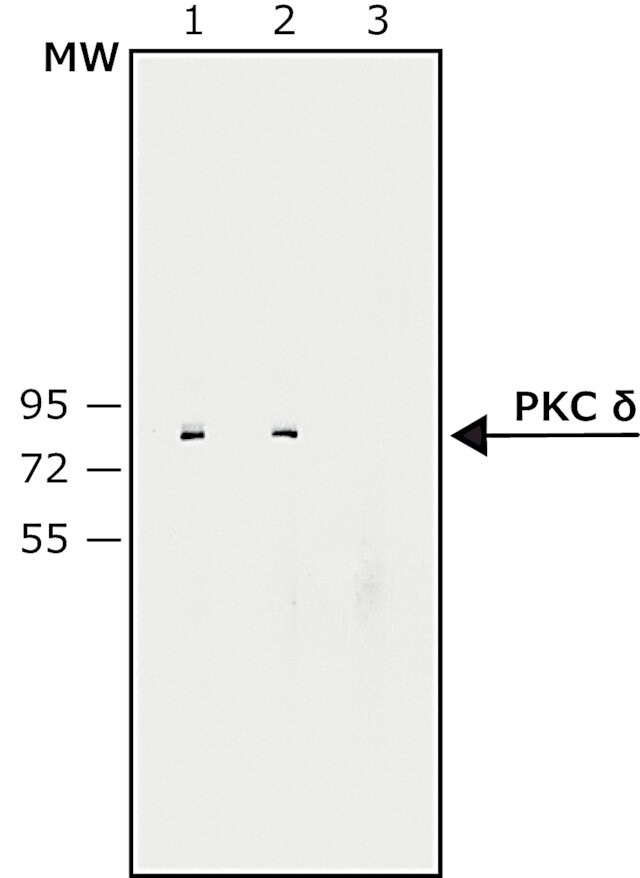您的位置:首页 > 产品中心 > Anti-Protein Kinase Cδ antibody produced in rabbit
Anti-Protein Kinase Cδ antibody produced in rabbit

产品别名
Anti-Protein Kinase Cδ antibody produced in rabbit
Anti-PKC δ
基本信息
| MDL number | MFCD00162772 |
| NACRES | NA.44 |
| General description【一般描述】 | Protein Kinase C (PKC) is a family of serine/threonine (Ser/Thr)-specific protein kinases. PKC is a phospholipid-dependent enzyme, activated by the lipid 1,2-diacylglycerol (DAG). The protein kinase C delta (PKC δ) isoenzyme appears to be widely expressed in the brain, lung, heart, spleen, liver, ovary, pancreas, thymus, adrenal gland, skin and rat embryonic fibroblasts, and is expressed in lower levels in certain mouse fibroblasts. PKD is also located in the cytosol, nuclear compartment and in mitochondria in response to cellular stress. |
| Specificity【特异性】 | Anti-Protein Kinase C δ specifically reacts in dot-blot immunoassay with PKC δ peptide conjugated to BSA with 1-ethyl-3-(3-dimethylamino-propyl)-carbodiimide (EDCI). |
| Immunogen【免疫原】 | Synthetic peptide corresponding to the C-terminal variable (V5) region (amino acids 662-673) of rat PKC δ coupled to KLH with glutaraldehyde. |
| Application【应用】 | Applications in which this antibody has been used successfully, and the associated peer-reviewed papers, are given below. Western Blotting (1 paper) Anti- protein kinase c δ antibody may be used in:
|
| Biochem/physiol Actions【生化/生理作用】 | Protein kinase C (PKC) has a pivotal role in cell growth and differentiation, modulation of neurotransmission, signal transduction and oncogenesis. Anti-protein kinase c δ antibody can be used for studying the differential tissue expression and intracellular localization of PKC δ. It can also be used in western blotting and microarray. Protein Kinase C isotype δ (PKCδ) modulates the inflammatory response. It acts as a signal transducer of several signaling pathways. Hence it can be considered as a vital therapeutic target to treat sepsis induced-lung injury. In sepsis, PKCδ participates in platelet-mediated activation. Overexpression and stimulation of PKC δ leads to cell division arrest in Chinese hamster ovary (CHO) cells and growth inhibition of NIH3T3 cells. |
| Physical form【外形】 | Rabbit Anti-Protein Kinase C δ is supplied as liquid containing 0.1% sodium azide as preservative. |
产品性质
| biological source【生物来源】 | rabbit |
| Quality Level【质量水平】 | 200 |
| conjugate【偶联物】 | unconjugated |
| antibody form【抗体形式】 | whole antiserum |
| antibody product type | primary antibodies |
| clone【克隆】 | polyclonal |
| contains【包含】 | 15 mM sodium azide |
| species reactivity | rat |
| technique(s) | dot blot: 1:50,000 microarray: suitable western blot: 1:10,000 using rat brain extract |
| UniProt accession no.【UniProt登记号】 | P09215 |
| shipped in【运输】 | dry ice |
| storage temp.【储存温度】 | −20℃ |
| Gene Information | rat ... Prkcd(170538) |
产品说明
| Storage and Stability【储存及稳定性】 | For continuous use, store at 2-8 ℃ for up to one month. For extended storage freeze in working aliquots. Repeated freezing and thawing is not recommended.Storage in "frost-free" freezers is not recommended. If slight turbidity occurs upon prolonged storage, clarify the solution by centrifugation before use. |
| Disclaimer【免责声明】 | Unless otherwise stated in our catalog or other company documentation accompanying the product(s), our products are intended for research use only and are not to be used for any other purpose, which includes but is not limited to, unauthorized commercial uses, in vitro diagnostic uses, ex vivo or in vivo therapeutic uses or any type of consumption or application to humans or animals. |




